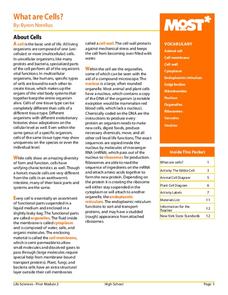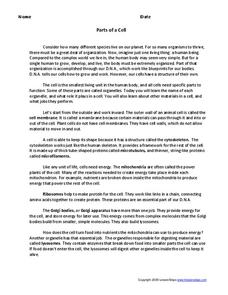Biology Junction
Cells and Their Organelles
This series of handouts and images asks young scientists to read short informational paragraphs, answer identification questions, and color and label diagrams of animal and plant cells. This is a complete resource that could be given as...
Curated OER
Build Your Own Cell
For this building your own cell worksheet, students identify cell vocabulary and facts, and create posters of a labeled plant cell and an animal cell. In this fill-n-the-blank and posters worksheet, students provide twenty-three answers.
Curated OER
What Are Cells?
Energize the cells of young biologists with an edible life science activity. Engaging students in exploring the inner workings of plant and animal cells, this activity involves using colored jello and various sweet and...
Lincoln Public Schools
Cell Exploration Activities
Engage young biologists in exploring the mysteries of life with this collection of hands-on activities. Enlisting the help of numerous digital resources, students get an up-close look at the structure of plant and animal...
The Science Spot
Cells & Organelles
Familiarize young biologists with the inner workings of eukaryotic cells with this vocabulary worksheet. By cutting out and matching a series of definitions and memorization tips to the organelles listed in the provided...
Biology Junction
Plant Cell Coloring Worksheet
In this plant worksheet, pupils define each part of the plant cell. They color and label the cell drawing and then compare and contrast plant and animal cells.
K12 Reader
What’s in Your Cells?
Organelles, cellular respiration, ATP, and DNA. The passage attached to this life science reading comprehension activity is all about cells. After reading about diffusion and osmosis, kids answer a series of questions based on the text.
Curated OER
Animal Cell Diagram
In this animal cell diagram worksheet, students are to draw a cell in the blank space and label it using words in the word bank. No information is given about what the cell would look like.
Curated OER
Parts of a Cell
Simplify the parts of a cell with this handout and brief activity. Learners read a two-page explanation of the parts of a cell that includes bolded vocabulary words. Using what they have just read, class members answer 19...
Curated OER
Science Crossword Puzzles - Cell Structures
In this science crossword puzzle worksheet, students answer 8 clues using vocabulary associated with cell structures. The questions are mostly about structures and functions.
Gallantsbiocorner.com
Cell Membrane & Transport
Young scientists demonstrate their understanding of cell transport on this comprehensive worksheet. Focusing on cellular structure and the different processes that allow materials to move into, out of, and throughout animal...
Gallantsbiocorner.com
Cell Organelles
Young scientists take a trip into the microscopic world of cellular biology with this practice exercise. Given pictures of different organelles, students must correctly identify specific parts of each cellular structure to demonstrate...
Curated OER
Cell Structure and Function
In this cell activity, learners chart the function of various cell structures. Students list the organization of a multicellular organism and illustrate plant and animal cells.
Curated OER
Cell Respiration Worksheet
Beginning biologists demonstrate their grasp on cellular respiration, photosynthesis, and energy flow though ecosystems when completing this worksheet. Fifteen multiple choice and short answer questions test their knowledge. Because of...
Curated OER
Regents High School Examination: Living Environment 2003
The living environment, from the interior of a cell to the complex relationships among populations, are queried in this final examination. Learners look at air pollution maps, diagrams of cells, population graphs, and drawing of cells....
Curated OER
Comparing Plant and Animal Cells
In this comparing plant and animal cell worksheet, learners use a microscope to observe cheek cells and onion cells. They compare their observations and answer 3 questions about their discoveries.
Curated OER
Plant Cell Coloring
In this plant cell worksheet, students color a diagram of a plant cell, identify its parts and answer four analysis questions.
Curated OER
Cell Parts
In this biology worksheet, students read about the parts of both plant and animal cells and examine cell diagrams. They read about the function of cell parts before answering 11 online fill in the blank questions.
Curated OER
Review of Cell Organelles
In this cell organelles instructional activity, students read the structure and function of different plant and animal cell organelles to determine what organelle is being described. Students write in the 15 organelles into a chart.
Curated OER
Regents High School Exam: Living Environment 2008
Tne New York Regents High School Examinations are comprehensive and include various styles of questions, includingmultiple choice and the analysis of graphs. This particular version, the 2008 Living Environment exam surveys a variety of...
Curated OER
Cross-Section of an Animal Cell
A scanned copy of a diagram of the animal cell is what you will find on this worksheet. Learners label organelles on the lines provided. Unfortunately, the figure and font are somewhat fuzzy.
Curated OER
Membranes
Biology pupils take the cell membrane apart piece-by-piece as they complete this worksheet. They describe the structure of the cell membrane and explain the processes that transport materials across it. This phenomenal resource even has...
Curated OER
The Great Animal Systems Challenge!
Advanced placement biology aces list systems that have evolved over time, adaptations, and structure-function relationships. The resource requires plenty of writing to answer these questions, so allow a few days for them to complete the...
Curated OER
Structure and Function of the Cell/Introduction to the Cell
So, this is not technically a worksheet, but rather a chapter of reading material, pictures, and diagrams introducing young biologists to the cell. Cell theory, diversity, size, and shape are described. The internal organization and...























